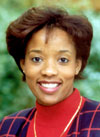
Vol. 77, No. 8, August
2004
The Perfect Storm
Issues that evoke visceral reactions and strong argument can set the
stage for the perfect storm. To weather it and move forward with real
and lasting results, we need candid, civil, and purposeful
discussions.
by Michelle A. Behnke
 Barely a month after my swearing in, I got word that WisTAF
(the Wisconsin Trust Account Foundation) had filed a petition asking the
Wisconsin Supreme Court to assess each active lawyer in Wisconsin $50 to
be used to fund civil legal services for indigent persons. WisTAF's
petition cites the prolonged decline in interest rates and changes in
the nature and use of trust accounts as two of the reasons for seeking
the assessment. WisTAF also asserts that efforts to get voluntary
contributions from lawyers have been largely unsuccessful. [Editor's
Note: Read the WisTAF petition and comment on the issue:
Barely a month after my swearing in, I got word that WisTAF
(the Wisconsin Trust Account Foundation) had filed a petition asking the
Wisconsin Supreme Court to assess each active lawyer in Wisconsin $50 to
be used to fund civil legal services for indigent persons. WisTAF's
petition cites the prolonged decline in interest rates and changes in
the nature and use of trust accounts as two of the reasons for seeking
the assessment. WisTAF also asserts that efforts to get voluntary
contributions from lawyers have been largely unsuccessful. [Editor's
Note: Read the WisTAF petition and comment on the issue:
www.wisbar.org/newscenter/feature/2004/0722.html.]
A few short weeks later, I received a draft of the Ethics 2000
report. The Ethics 2000 Commission (appointed by the supreme court to
review the Wisconsin Supreme Court Rules of Professional Conduct) will
recommend to the supreme court that the Rules of Professional Conduct be
amended to include a requirement that lawyers report their pro bono
service hours on an annual basis and strive to give 50 hours of pro bono
legal service annually or the equivalent monetary contribution.
No one will argue that providing civil legal services is not
important and necessary to the workings of our judicial system, and no
one will argue that lawyers do not have a special obligation to assist
those who cannot afford legal representation. But what many lawyers are
likely to argue about is how we achieve adequate funding for civil legal
services. People also are likely to argue over how much pro bono service
currently is being provided by lawyers and whether pro bono legal
services should be mandatory or voluntary. Still others may debate
whether additional pro bono services will adequately address the
systemic problems or whether money is the answer. Of course people also
may argue over who should be making funding decisions with money that is
collected from lawyers. With all this arguing, the stage is set for the
perfect storm.
When I was sworn in, I suggested to the members that I wanted to use
my time this year to have candid conversations and
mutual conversations from which we could all take away a deeper
understanding of the promise of the law and the prospects for our
profession. I also said that I wanted to have purposeful
conversations that propel us to action. I said that I wanted it to be
more than just talking for talking's sake. I said that I wanted the
discussion to produce real and lasting results. Well, now is the time to
start talking.
I believe that we need to get beyond the visceral reaction to
anything mandatory and talk about solutions and alternatives. We must
explore the likelihood of obtaining funds from the various funding
sources. We need to talk about the role of pro bono in meeting civil
legal service needs and our commitment to pro bono service. A simple yes
or no vote won't really address these issues. Our discussions need to be
deeper, and our discussions must be more creative. Above all, I hope
that our discussions are civil and productive.
Communicating is what we do as lawyers. Now is the time to
communicate on these important issues. As thoughts and ideas come to you
please share them with your board of governors representative. Write a
letter to the editor. Share your thoughts with me when I come to your
local bar association meeting. You may have a new way of looking at an
issue or a novel solution. We need everyone.
What is the solution to low interest rates? How do we get the larger
society to contribute to the funding of civil legal services? How do we
meet the pro bono needs? Who should decide how funds are distributed?
How does individual choice fit into this picture? I don't know, but I
hope you'll participate in the discussion.
Wisconsin
Lawyer
